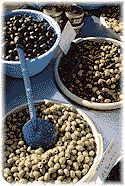
 Olives
of Cyprus
Olives
of Cyprus
Harvest
of Black Gold...
 Olive
oil is a humble yet vital part of the diet of millions of people
around the world, and especially is this so in the Mediterranean
region of which North Cyprus is a part. Many people see olives
and the rich oil extracted from them as some sort of wondrous
elixir that guarantees a long and healthy life. The amazing
qualities attributed to eating olives and drinking the oil
appear so beneficial, so important for health and strength that
for many people they are the difference between life an death!
Olive
oil is a humble yet vital part of the diet of millions of people
around the world, and especially is this so in the Mediterranean
region of which North Cyprus is a part. Many people see olives
and the rich oil extracted from them as some sort of wondrous
elixir that guarantees a long and healthy life. The amazing
qualities attributed to eating olives and drinking the oil
appear so beneficial, so important for health and strength that
for many people they are the difference between life an death!
This is the
time of the olive harvest in North Cyprus and all the figures
thus far suggest that the harvest this year has been
particularly good. Harvest time usually begins sometime in
October, when the early green olive first fruits are gathered
either by shaking the branches over sheets spread on the ground
around the tree, or by individually picking the olives by hand.
Pressing the
olives for oil or treating them for consumption as black or
green olives at the breakfast table usually lasts until around
the month of March. This year the harvest of "black
gold" as olives are sometimes described is unlikely to
reach the record crop of 1999, when 8,000 tonnes were harvested,
but growers are happy that despite poor rainfall during the
year, their trees have again produced well.
Complaints that
lack of proper marketing and sales technique reduces profits
have in part been dealt with by bringing in new pressing
equipment from Italy. This means that processing will go faster,
helping growers to reach their markets quicker. Most growers in
North Cyprus sell their olives to be pressed, feeling that there
is a better market for the oil rather than for the familiar
black or green olives that adorn the tables of most
Mediterranean families.

 Magical Olive
Oil
Magical Olive
Oil
 |
| A
drop of extra virgin olive oil on a warm bread with
cheese and olives make simple but delicious lunch |
So what is it
about olive oil that makes some people drink down a glass of it
with their breakfast every morning? The high consumption of
olive oil around the world makes it clear that for countless
consumers it has become more than an indispensable part of their
diet. Most food experts, dieticians and health-conscious agree
that olive oil contains elements that fight cholesterol, help to
reduce blood pressure and by reducing fats in the blood, lower
the risk of heart attacks. These almost miraculous qualities of
olive oil have long been recognised by people living in the
Mediterranean countries, and the diet they follow has come to be
seen as a vital contribution to health.
Olive oil is
also hugely versatile. In the past, the oil was used for
cooking, lubricating, medicinal purposes, cosmetics and fuel.
Often mixed with exotic perfumes, olive oil was frequently used
as a balm for the skin, applied after bathing or after long
hours spent under the sun. History tells us that being anointed
with the oil was an honour worthy of kings. In fact, olive oil
was once so valuable that it was used as a form of currency, or
given as an expensive gift. The soothing qualities of olive oil
eased the pain of minor wounds and the bruises of everyday life.
It was used in the embalming and preservation of the bodies of
the rich and the famous.
Even in this
modern era, olive oil has lost none of its usefulness. It is
still used in cosmetics and some lubricants. The residue after
processing is often used as cattle food. It is still a major
source of vital vitamins and other essential trace elements.
Further, olive oil is used in detergents and in the textile
industries. Its popularity has grown worldwide and is recognised
as a vital food in regions far beyond the Mediterranean
countries. Especially as its high vitamin E content is thought
to reduce the ravages of the passing years. Even the wood of the
tree is still valued as a high quality hard wood with a fine
grain that is ideal for turning, with cut-offs and small
branches used for fuel.
Olive oil
addicts are warned however that olive oil is not the total
answer to all their health problems. It is still one hundred
percent liquid fat and every tablespoonful contains about 125
calories. Whether "light" or not, olive oil can be
very fattening and is unlikely to have more than a fairly
limited role in maintaining the overall health of our bodies.

 Origins
Origins
It seems that the
often gnarled and gray branches and trunks of the fairly small
olive tree were first cultivated for their olives about six
thousand years ago in areas of the Middle East. They have been
cultivated on the island of Cyprus for four thousand years or
so. This slow growing, but long living evergreen takes about ten
years to grow to maturity, but after that it yields olives for
perhaps hundreds of years.
 For
maximum production the tree needs stringent pruning every ten
years or so, cutting right back to the main branches. This
rejuvenates the tree and crops can be expected to increase to
full capacity within three years.
For
maximum production the tree needs stringent pruning every ten
years or so, cutting right back to the main branches. This
rejuvenates the tree and crops can be expected to increase to
full capacity within three years.
In North
Cyprus, as in other Mediterranean countries the olive tree can
be seen everywhere, in the wild and under cultivation. Usually
favouring well drained sunny hillsides, olive trees can nevertheless
thrive in backyards and flat plain lands.
The nurture and
care of olive trees is a matter of some skill. Although olive
trees can live and produce olives for hundreds of years, they do
need skilful pruning and without attention they can soon die
off. This has been the case in North Cyprus, but now that young
trees planted and have started to produce, growers are hoping
once again North Cyprus region will be a serious Mediterranean
producer. Some estimates suggest that there are about 800
million olive trees under cultivation around the world, and
nearly all of them are in the Mediterranean countries.
|
 |
|
Green,
Black and crushed Chakistes olives at a market stall |
The first light
pressing of the olive yields the best oil, high quality
"virgin" oil. "Extra virgin" oil has a very
low acid content and is eagerly sought after. Apart from the
growers, people in North Cyprus who have their own trees also
like to process their own olives. The traditional ways are still
followed. Sometimes, the olives are individually nicked with a
knife to help in the soaking process before salting the olives
to preserve them. Often the olives are given a sharp blow
with a stone and these crushed olives (called
Chakistes) take on
a special flavour of their own mixed with olive oil lemon juice,
garlic cloves and coriander seeds. Other methods produce the
familiar salty black olives that add so much flavour to meals
and snacks.
For centuries,
olives have enjoyed a never failing popularity, one that
continues to grow as more and more people come to appreciate
this source of `black gold' and come to enjoy the richness that
olives bring to their diet. Olives have long been recognised as
a symbol of good living and their miraculous oil can indeed
restore us in some measure that elusive good health which we are
all searching for.
 Recipies
Recipies



 Articles - Makaleler
Articles - Makaleler
 Making
the World Taste Better - Cyprus
Making
the World Taste Better - Cyprus
 Kuzey
Kıbrıs'ın Dünya Mutfağına Sunuşu: Lalangı
Kuzey
Kıbrıs'ın Dünya Mutfağına Sunuşu: Lalangı
(Lalangı: A Contribution of North Cyprus to
World Cuisine) TR

 References
References
 Vegetarian
dishes have been marked with sign
Vegetarian
dishes have been marked with sign

 Albrecht, M
(1994), Turkish Cypriot & Mediterranean Cookery
Albrecht, M
(1994), Turkish Cypriot & Mediterranean Cookery
 Salaman, R.,
(1991), The Cooking of Greece and Turkey.
Salaman, R.,
(1991), The Cooking of Greece and Turkey.
 Jemal, H., Cyprus
Today, various.
Jemal, H., Cyprus
Today, various.





 For
maximum production the tree needs stringent pruning every ten
years or so, cutting right back to the main branches. This
rejuvenates the tree and crops can be expected to increase to
full capacity within three years.
For
maximum production the tree needs stringent pruning every ten
years or so, cutting right back to the main branches. This
rejuvenates the tree and crops can be expected to increase to
full capacity within three years. 



